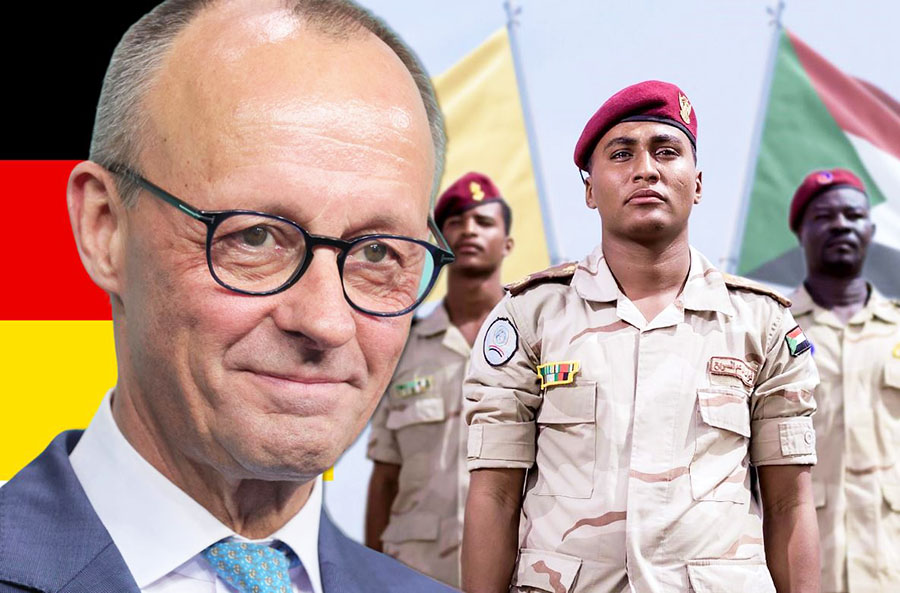
Greek newspaper: How did Germany get involved in the Sudan war?
Source: in.gr
Even the Germans couldnt believe their ears when they heard Chancellor Friedrich Merz say a few days ago that Israel was "doing the dirty work" on behalf of the West by bombing Iran. And the Minister of the Chancellery, Torsten Frei, described Iran as a "terrorist regime!" At the same time, however, Berlin is doing the "dirty work" on behalf of the Europeans in Sudan.
Throughout the events following the overthrow of dictator al-Bashir in 2019, major powers – particularly Germany and the EU – played a significant role at the political, military and economic levels.
As EuObserver reports , Germanys involvement went beyond rhetoric and included indirect arms transfers through third countries, funding immigration control programs that empowered armed groups, and channeling development aid through unregulated state institutions to criminals.
But all of this contributed to paving the way for todays war.
German weapons to criminals
Despite an official arms embargo on Sudan following the Darfur conflict, multiple reports confirm that German weapons—particularly those manufactured by Heckler & Koch—continued to appear in Sudan through intermediaries.
Germany has exported billions of euros worth of weapons to Gulf countries and Egypt that are directly on one side or the other of the conflict, something Berlin is well aware of.
"Through these channels, weapons and military equipment of German origin found their way onto the battlefields in Sudan, indirectly implicating Germany in the arming of both sides," notes Egyptian journalist Simma Sami.
He recalls that since the Cold War era, West Germany had worked closely with Sudan, leading to the establishment of infrastructure such as the Fritz Werner munitions factory near Khartoum in the late 1960s. A legacy that, according to some analysts, shaped aspects of Sudanese militarism.
European money for terrorists
In 2014, the EU launched the "Khartoum Process" to curb illegal migration from the Horn of Africa region, with Germany playing a central role in financing the relevant implementation projects.
The Sudanese Rapid Support Forces (RSF) - accused of crimes against humanity - have in practice benefited from EU-backed border control programs, such as the "Better Migration Management" initiative led by the German GIZ (International Cooperation Agency), says Sami.
“These programs strengthened the RSF’s de facto role in policing Sudan’s borders, raising concerns about indirect European support for abusive actors,” reports Euobserver.
Ultimately, Europe outsourced parts of its border management to Sudanese forces, including the RSF, funding programs that provided surveillance equipment such as cameras, scanners, servers, and communications systems, as well as vehicles such as Toyota Hilux and Land Cruisers.
Despite the fact that these means were intended for border management under initiatives such as the EU-funded “Better Migration Management” (BMM), they were subsequently, Sami notes, used by RSF to suppress internal protests.
For example, in June 2019, at least 186 civilians were killed during the sit-in protest in Khartoum.
Development aid and financial agreements
After al-Bashirs fall, Germany and its European partners rushed to support Sudans transitional government through international donor conferences and generous funding pledges.
However, most of these funds were channeled into infrastructure and institutional aid — through state agencies still controlled by the military or allied technocrats.
According to Oxfam, only 3% of the EU Emergency Fund for Africa was allocated to support local communities or safe migration routes. The vast majority went to border surveillance and security systems.
20 years of criminal policies
“Over the last 20 years, European - and especially German - policy towards Sudan has been characterized by short-term pragmatism: an emphasis on migration control and stability rather than responsibility and reform,” Sami observes.
This approach empowered the conflict actors, whether through indirect arms transfers, security partnerships, or opaque aid flows.
Germany and the EU are responsible not only for what was done, but also for what was omitted: the failure to impose sanctions after the 2021 coup, the lack of pressure to disarm the groups, and the inability to protect Sudans fragile transition process from military intervention. Today, Sudanese citizens are paying the price: with displacement, sexual violence, mass killings, and the collapse of the state.
This somehow mitigates the obligation that the German Chancellor - a descendant of a Nazi official - feels towards the Israeli occupying but criminal forces for their work in the Middle East.

